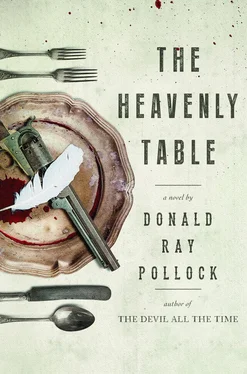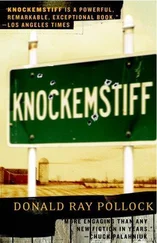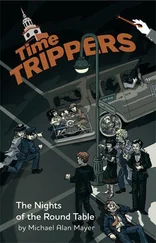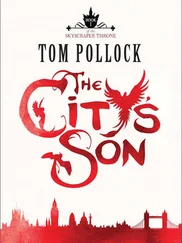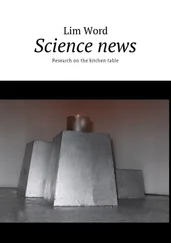Bagshaw pulled at his chin and studied his young visitor, the pith helmet in his lap and the gloomy, dejected look on his face. He hadn’t seen the boy so down in the mouth since Itchy had croaked. This was one of those situations, he realized, where the wisdom of an older, more experienced man such as himself was called for. Even Agnes asked him for advice on occasion, and she was one of the sharpest people he’d ever met. “You know what you need, Jasper?”
“What’s that?”
“A friend,” the dump keeper said, nodding sagely, “a real friend. You find you one of them, you won’t need no suitcase full of money or fancy shithouse to make you happy. Believe me, it makes a big difference wakin’ up every day knowing you got somebody you can talk to, someone you can depend on.” Then, with rotten banana oozing thick as paste through the few teeth he had left in his head, he looked up at the doll and smiled.
IT WAS GETTING late in the day when Chimney looked up and saw two men sitting in a carriage watching them from the road. “Friends of yours?” he asked Ellsworth.
The farmer stopped in the middle of wrapping a piece of twine around a shock of corn and turned to look. It was Ovid and Augustus Singleton. “Not hardly,” he said, just as one of them took off his hat and waved.
“Wonder what they want then?” Chimney said.
“Nothing,” Ellsworth said. “They’re just being nosy.” He handed Cane the ball of twine, then started up through the field. “Don’t worry. I’ll get rid of them.” Right before the boys came in for breakfast this morning, Eula had mentioned that she thought there might be more to their situation than what they were letting on. “Don’t it seem a little strange to you,” she said, “them willin’ to pay all that money to sleep in a barn?” He had chosen not to tell her about the stubby pistols he saw in their pockets, or the way they glanced about uneasily whenever they heard the slightest noise. As hard as they worked, he could tell that they hadn’t been lying about all the farming they had done, but there also wasn’t any doubt in his mind that some sort of trouble had brought them here. “What do ye want me to do? Tell them to leave?” he’d asked her, resisting the urge to point out that she was the one who had made the deal with them. “No, no,” she said, “I just wondered what you thought.” Since it was the first time she had asked his opinion about anything since he had lost their savings, he considered carefully for a minute before answering. “Well, unless they start causin’ trouble,” he told her, “let’s just figure it’s none of our business.” And now, as far as he was concerned, that went double for the Singleton brothers.
“What the hell did he mean by that?” Chimney asked Cane as they watched the farmer approach the carriage.
“I don’t know,” Cane said.
“Think he’s got us figured out?”
“If he has, he don’t seem too worried about it.”
“Maybe Cob’s been runnin’ his mouth to the old woman,” Chimney said.
“Let’s just wait and see,” Cane said. “Maybe he didn’t mean nothing at all.”
At the edge of the field, Ellsworth stopped and nodded to the Singletons. Despite it being a rather warm day, they both wore heavy black coats and gloves. “You need something?” he asked them impatiently.
“We noticed you got yourself some help,” Augustus said. He was waving a little paper fan in front of his face that advertised Smith’s funeral home in Bainbridge.
“So?”
“Well, we were just trying to figure out who they were. From here, they sort of look like Sawyer Brown’s boys.”
“They’re nobody,” Ellsworth said. “Just a couple boys from Pike County needin’ work.”
“Pike County?” Ovid said. He cast a cocky leer over at his brother. “Did ye hear that, Auggie? You’d think ol’ Fiddler would have enough sense to stay away from there after what happened last fall.”
“Moo,” Augustus said, and they elbowed each other and began laughing.
Ellsworth’s face turned red and his hands tightened into fists. So they’d found out about the cattle swindle. And if they knew, that meant everybody in the entire goddamn township knew. Since it had happened down in the next county, he had hoped to keep it a secret, and he wondered now if Eddie had betrayed him. The boy had sworn to keep quiet about it, but he had proven time and again that any promises he made sober were easily forgotten once he got some alcohol in him. Jesus Christ, people were probably spending entire evenings over at Parker’s store cackling about it. He recalled going over there one night right after Royal Sullivan sent away for a mail-order bride who turned out to be deaf as a stone and dumb as a post. For three hours they’d gone on about it, joke after joke. And she hadn’t cost but seventy-five dollars. That was peanuts compared to the thousand he had lost. And at least Royal still had something to show for his money, no matter how useless the woman was when it came to following commands. Ellsworth looked up at the two in the carriage, still poking each other in the ribs and hee-hawing. It seemed like every time he came across them, they tried to cut him down. And he’d been having a damn good day, too. He started to turn away from them when he suddenly remembered something else he had heard over at the store one evening after Ovid and Augustus had taken off for home, the way they always did the minute the evening sun slid behind the big evergreen that stood in front of Dave Moody’s house, no matter what the season. He waited until they stopped to catch their breath, then said, “So is it true what people say, that ye hold each other’s hand when you go to the shithouse?” He heard them both gasp, watched the blood drain out of their faces. Without another word, Ovid smacked one old nag’s hindquarters with a long willow switch, and the rickety carriage heaved forward with a lurch. Good God, Ellsworth thought, as he watched them disappear over the slight rise in the dusty road, he’d always thought the story was just another one of Parker’s wild tales, but maybe it was true after all. Even though he didn’t give one iota for either of them, he almost wished he hadn’t mentioned it. Things had to be tough, being that fucked-up, no matter who you were.
FOUR FEET OF water and a muddy bottom had broken Sugar’s fall from the bridge. After the initial shock, he took account of himself as best he could with his hands tied behind his back and determined that nothing was broken. He got to his feet and managed to get his razor from his pocket and cut the ropes that bound him, then struggled up the riverbank. The campfire glared above him by the tracks, and he could hear the men laughing, as if what they had done to him was no different than killing a dog or a possum. Though his legs were wobbly, he began walking, water dripping from his clothes, squishing from his shoes. He reached up to feel a knot on the back of his head. His nose throbbed, and he tasted blood in his mouth. The moon came out from behind some clouds and showed him a way through the cattails and brambles. He headed on south.
The next afternoon, he arrived in Shadesville. He walked through the little burg with its grocery and barbershop and post office, and went out the other side past the Baptist church. He continued another quarter mile until he came to the house he had been born in. It was empty. Sugar stood there for quite a while looking at it, weather-beaten and leaning a little eastward with two smallish rooms and a wood-shingled roof. It was hard to believe, he thought, that nine people had once lived there together. Shit, the apartment he had shared with Flora was twice as big. He went up the three rotten steps and through the unlocked door. Except for a rusty hairpin he found lying on one of the two windowsills, the house was completely bare inside; and judging from the dust on the floor, he figured nobody had been there in a long time. He was so tired that he didn’t feel anything, not even disappointment.
Читать дальше
